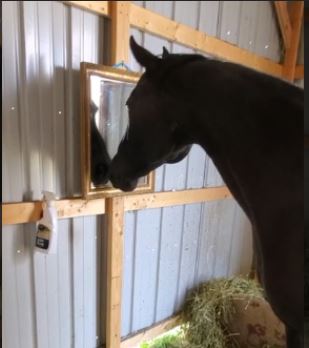The ability of visual self-recognition, as in recognizing oneself in a reflection in mirror is a measurement of self-awareness — the experience of one’s own personality or individuality.
However, animals can be self-aware in ways not measured by the mirror test, such as distinguishing between their own and others’ songs and scents.
Phoebe Southworth reports for the UK Telegraph, March 27, 2021, that many primates, as well as elephants, bottlenose dolphins, magpies and a small fish called a cleaner wrasse have previously been found capable of recognizing their mirror reflection.
But a recent study led by Dr. Paolo Baragli of the University of Pisa in Italy, published in the journal Animal Cognition, found that horses, too, can recognize their reflection in a mirror and even preen themselves.

Methodology:
- A large standing mirror was placed in an indoor arena, into which a horse would be let loose one at a time.
- At first, the horses all behaved as if their reflection was another horse. Some tried to play with their mirror image, others showed fear or aggression towards it.
- However, the majority eventually began to investigate this “other horse” they could see in the glass. 11 of the 14 horses moved their heads around and saw their reflection move in tandem. They also walked around the back of the mirror, as if they were checking whether the image they saw was three dimensional. Some even stuck their tongues out at the glass to be absolutely sure the mystery horse was them. The horses appeared to finally understand they were not looking at a fellow equine.
- Scientists then used medical ultrasound gel to paint a colored X on the 11 horses’ cheeks. Their reactions, filmed in a total of 22 hours of footage, were then analyzed.
- All the horses stood in front of the mirror and appeared to recognize that they had a mark on their face, as they were seen rubbing their marked cheek against their leg then checking their reflection again to see if the X had gone.
Dr. Baragli said: “They’re either trying to explore the mark on their face or trying to get it off. It’s hard to imagine there’s any other reason for this behavior.”
But some experts are skeptical of the findings and argue that the horses would never have investigated their reflection in the mirror if they hadn’t been prompted to do so. Gordon Gallup, a psychologist at the University at Albany in New York, said: “None of the horses spontaneously used the mirror to investigate parts of their bodies that could not be seen without a mirror.”
Dr. Baragli remains convinced the horses’ behavior shows they understand they are looking at themselves in the mirror, and that they can use the mirror to make modifications to their appearance. He believes this is an important first step in establishing whether all equines comprehend the concept of individuality and are conscious of how they look.
Telegraph readers, like the comment below, noted that horses must have seen and recognized their reflection in water when they bend down to drink:
Of course horses know their own reflection, they have been looking at themselves when drinking for aeons. The same goes for zebras, and countless other animals. They would startle if they saw the face of a lion behind the head of the horse in the water.
Other readers point out that research like this, hopefully, will make us humans be less cruel toward animals:
We have been underestimating the abilities and sensitivities of animals for ever. That is how we are able to enslave and mistreat them. Sooner or later, research like this is going to make us see that.
~E
